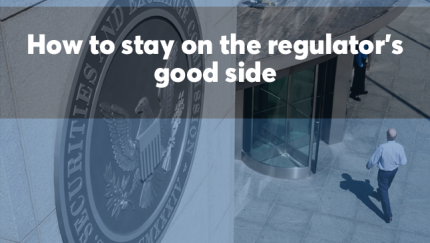Q: I have a client with an account for his revocable living trust and a 401(k) with his employer. The trust account is non-discretionary but usually about once a year the client will ask me to look over his 401(k) and let him know if I think he should move his assets from one fund to another within the 401(k). Are either of these accounts covered by the new DoL fiduciary rule?

A: First, note that the new rule only applies to retirement assets. That includes IRAs, 401(k)s, Keogh Plans and just about everything else involving retirement assets, but it does not cover revocable living trusts or other types of accounts that are set up for estate planning purposes. So in regards to the first part of your question, no, you don’t need to worry about the rule affecting the revocable living trust account.
As to the rest of your question, the issue is whether the recommendation you’re making constitutes so-called conflicted advice. In other words, does your advice cause you to have a conflict of interest such that your fees will increase (or such that you’ll now be entitled to a fee where you weren’t before)?
In your case, your compensation remains the same regardless of whether the client uses one fund or the other so there is no conflict and the DoL rule would not apply.
From recommending wrong share classes to cherry-picking allocations, these are the pitfalls advisers should avoid.
Q: When I first started at my broker-dealer, I had an outside business which I disclosed to them and for which they gave me approval. Fast-forward five years later and my manager has told me that I misrepresented my outside business activities on the annual questionnaires they gave me and that I’m likely facing termination unless I voluntarily resign. I want to fight this since I absolutely disclosed this to them initially. What do you think?
A: FINRA Rule 3270 requires reps to provide “prior written notice” to their employer of any outside business activity. However the supplementary material to the rule makes it clear that a member firm has an obligation to consider whether that activity would interfere with the rep’s responsibilities to his/her clients or whether the public might view that activity as part of the member firm’s business.
The supplementary material also makes it clear that the firm has a responsibility to evaluate the rep’s outside business activities and can impose restrictions on it or even prohibit it altogether. To comply with this obligation, firms will not only ask a rep about his outside business activities when joining the firm but also on an annual basis.
Now here’s where it gets tricky. Most firms will simply ask if you have any outside business. They generally do not ask if you have any new outside business activities or any that you haven’t previously disclosed. They simply ask if you have any at all. Despite the fact that you may have previously disclosed your outside business, if you answered “no” on the annual questionnaire asking if you had any outside activities, then you made a misrepresentation on the firm’s records.
While you may not be in violation of Rule 3270, you could, very likely, be in violation of the firm’s internal policies as well as causing the firm’s books and records to be inaccurate. I recommend that you contact an attorney to discuss your options. Even if the firm allows you to voluntarily resign, it’s likely that they will nevertheless note on your U5 that you were under an internal review at the time of your resignation. That will almost certainly result in a FINRA investigation and possibly a fine.






